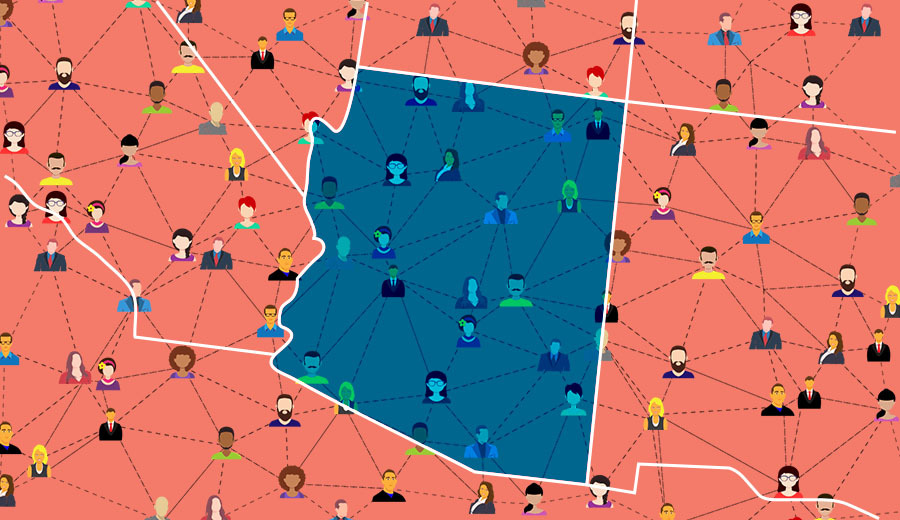Written By: Erin Stilwell, AG Bell Arizona Board Member
On April 23, 2020, professionals and members of the community who are deaf and hard of hearing came together online for an enlightening panel discussion about how COVID-19 has affected those living with hearing loss.
Hosted by AG Bell Arizona, AG Bell members—which included parents, teachers and other hearing loss professionals—joined forces for this online event, entitled “PersevEARing Together.” Nearly 70 people attended. The topic revolved around how COVID-19 was impacting businesses and organizations centered around hearing loss. It also focused on how parents, children and teachers were directly affected by the global pandemic. Members and attendees discussed the challenges of transitioning away from face-to-face interaction, services and education. They also talked about how it was becoming more fluid.
Panelists included: Kendra Benedict, statewide director of the Early Learning Program at Arizona State Schools for the Deaf and the Blind; Deborah Flynn, audiologist at Phoenix Children’s Hospital; Carla Zimmerman of Zimmerman Speech and Hearing Center; Shanna M. Dewsnup, audiologist at Happy Ears Hearing Center; DeeAnn Chapman, executive director at Desert Voices; and Stephanie Farber, teacher at Desert Voices and vice president of AG Bell Arizona.
When COVID-19 hit, parents were faced with everyday obstacles, such as making sure they had the correct devices and accessories to best teach their children. Audiologists and speech/speech-language pathologists, who typically provide in-office care for their patients, shared how they shifted to teletherapy sessions and online follow-up screenings. Phoenix Children’s Hospital, Happy Ears Hearing Center, and Zimmerman Speech and Hearing Center discussed how they made the most out of this tricky situation.
Other in-person service transitions these providers discussed included curbside service, where patients can drop off and pick up devices, ask questions, or speak to the staff directly (from the safety of their car). Other elements of change included mask-wearing by staff and families, extra cleaning, and making sure families had access to technology for services they needed. The general feeling from the panel discussion was that the transition was not as frightening as anticipated, and that current technology made it possible to provide adequate services for their patients, for the time being. Many resources are available for families as well, including information on communication, devices, applications for listening/speech, assistance with technology and real-time captioning.
Schools and organizations also made great strides to provide the services to their students who needed them. Desert Voices and Arizona School for the Deaf and Blind both had smooth transitions with the help of parent support, technology and teacher training. Virtual learning is being used and parents have become the educators.
Medical professionals and educators agreed that they wanted parents and families to feel confident and proud of the work that they are doing during these unusual times. They encourage parents to be gentle with themselves and with their kids. The time spent at home should also be focused on the emotional well-being of the child. There are many resources for families to access, so parents are asked to advocate for their children. Using learning apps, technology, and the professionals in the medical and educational fields will prove beneficial for families.
Resources:
State of Arizona Commission for the Deaf and the Hard of Hearing:
Feedback about what the commission can do to help parents, schools, professionals, etc. [email protected].
Best Practices and Guidelines for Healthcare Professionals Providing Telemedicine https://www.acdhh.org/media/1835/acdhh-telemedicine-report_20200403.pdf Covid-19
Communication cards https://www.acdhh.org/media/1846/dhh-covid-19-communication-cards.pdf
ACDHH resources for HOH https://www.acdhh.org/hard-of-hearing/hard-of-hearing-resources/
Real-time Captioning
ACDHH provides free real-time captioning (not auto captions) for online group meetings that occur M-F 8am-8pm or Sat 8am-2pm. Contact [email protected] to have it set up
Audio splitter examples: https://www.wish.com/product/5e04caeb0d380f2b006ab220 https://www.walmart.com/ip/Belkin-Speaker-and-Headphone-Splitter-White/17771333
Applications for Listening / Speech
HearBuilder is offering a free trial during COVID for working on auditory skills. Customize the learning – https://www.superduperinc.com/promotions/freetrial.aspx
from Tina Childress – https://tinachildress.wordpress.com/2011/12/21/apps-for-kids-with-hearing-loss/
More from Tina Childress – https://raindrop.io/collection/2663069
Advanced Bionics Rehab program – https://advancedbionics.com/in/en/home/support/rehab.html
Cochlear Americas Sound Foundations – https://www.cochlear.com/us/communication-corner/program/infants-sound-foundation-babies.htm
List of many app for iOS – https://docs.google.com/spreadsheets/d/1jBcMgGGKgUY2myJz8749IIZIWFwjlxBUjcy35SnahPo
List of many app for Android – https://docs.google.com/spreadsheets/d/162LobVdSIS8Xyb2CGrLVmi7BACpxVz1czrvAb-Zh91A
Apps such at My PlayHome and Pepi Play are apps that engage children in routine based activities such as going to the bathroom, washing clothes, taking a bath, and other things around the house.
Potential Assistance with Technology (like FM/DM transmitters)
Ear Foundation – https://www.earfoundationaz.com/
United Healthcare Children’s foundation – https://www.uhccf.org
The school district could provide equipment for home loan.
Happy Ears Hearing offers the Roger Systems at cost without a markup – https://www.happyearshearing.com/
Phonak handout “Possible Funding Sources for Personal Roger Systems” – https://drive.google.com/open?id=1s4T6y-VsWGgYoGbhgEjY_ziH1AXBxgEe
General Links
Zimmerman Speech and Hearing on Facebook – https://www.facebook.com/ZimmermanSpeech/
Brene Brown’s new podcast, Unlocking Us and about “collective weariness”
Erin Stilwell is native to Arizona with a love for education and writing. She received her bachelor’s in communications and her master’s degree in elementary education from Arizona State University. Erin became involved with AG Bell in 2016, shortly after her daughter, Kendall, was diagnosed with sensorineural bilateral hearing loss. She is also a Phonak hEARo and works closely with the hearing loss community. Being an advocate for her daughter has become not only a passion, but a lifestyle for Erin.
Don’t miss out on great experiences like the Global LSL Symposium, LOFT programs, scholarships and more. Become an AG Bell member today! For more information and resources, please visit www.agbell.org.

